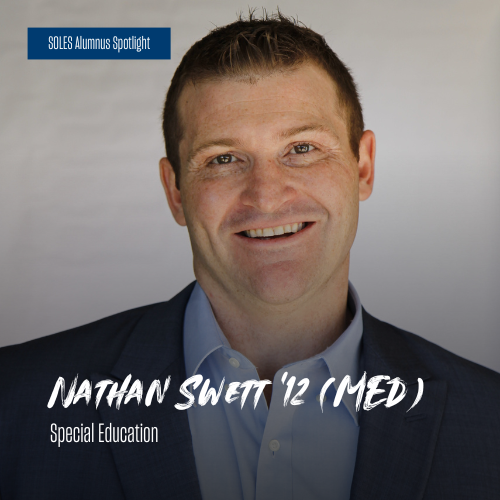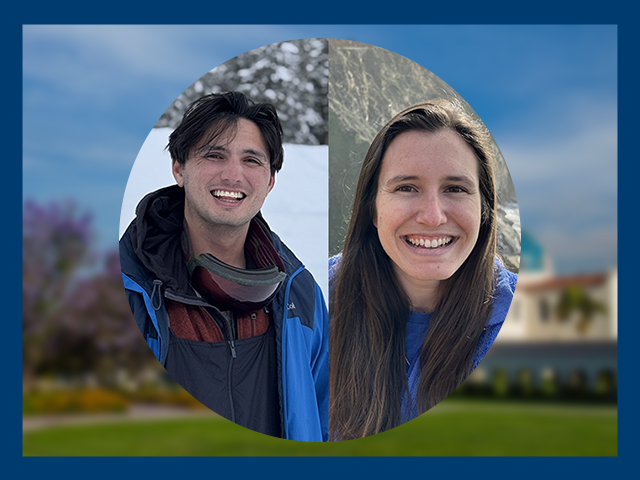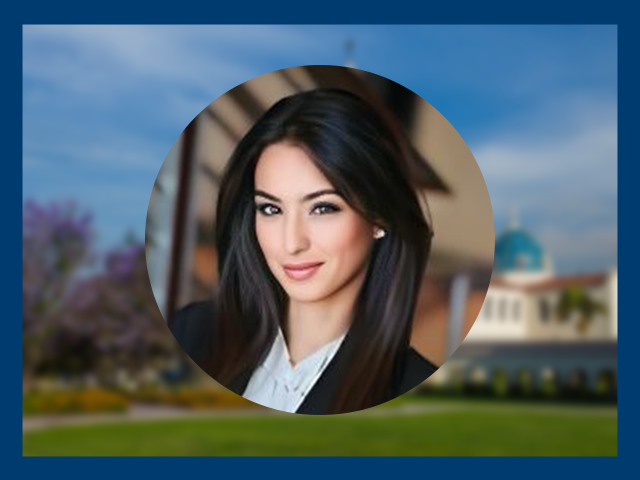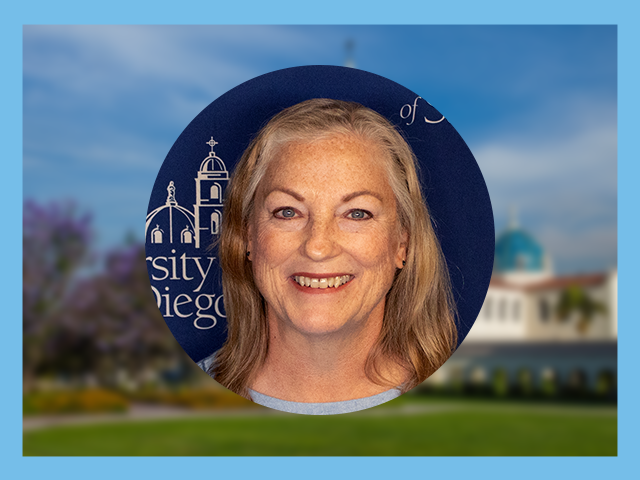SOLES Alumnus Spotlight: Nathan Swett '12 (MEd), Special Education

SOLES Alumnus Spotlight: Nathan Swett '12 (MEd), Special Education

Please tell us about your degree program, and why you chose to pursue that degree at SOLES.
I received my AA and transfer degree from Grossmont College. I then transferred to San Diego State University (SDSU) and received my BA in Theatre Arts. While I was at SDSU, I was also working at the Joan B. Kroc Institute for Peace and Justice (KIPJ) on campus at USD as an AV technician. As a USD employee, I was able to get a degree from the university. I looked through all the degrees that they offered for a Master’s in Technology. I’ve always been technology driven and focused, but I was also interested in going into special education because of my own learning experiences growing up with an IEP (Individualized Education Program) and not getting access to assistive technology (AT) until my years at Grossmont College. Thus, I didn’t get introduced to AT until my years in college, e.g. text-to-speech and reading my textbooks aloud. I felt like I could do something that would help kids at a younger age get exposed to technology to help them in school and feel more confident - that’s where I was thinking that degree in special education would take me. I enrolled in the Master’s in Special Education program at SOLES so I could go into education and help those students with learning challenges and give them resources so that they could succeed and not have the struggles that I had. I wanted to make a difference and impact them earlier in their lives, instead of waiting until higher ed, or not even making it that far.
What was your favorite class during your time in the program?
I enjoyed the Assistive Technology class, not just because I was interested in it, but because of our professor Jamie Tate-Symons. She was an adjunct professor and she was very connected. I always said, “if there’s anything that comes up, let me know because I’d be interested in working in this field”. That semester, she contacted an app company, and really got me connected in doing some side work in the field and changed the trajectory of where I headed in the field, as well. That was my favorite class because of that connection, and I think that’s what USD provides: smaller class sizes with adjuncts who are still active in the field and have connections.
Who was your favorite professor?
Dr. Anne Donnellan is probably my favorite professor because of the field I was going into. She became a mentor and helped me with a lot of things for my recommendations, encouraged me toward a more advanced approach like my doctorate degree, helped me with my research, guided me a little bit after I graduated from USD, and was a mentor for me in my field.
Can you tell us about your Action Research?
I did my action research in the field of assistive technology. I got a job through working with the assistive technology app company called AssistiveWare. I did some research on implementing augmentative alternative communication (AAC). AAC helps people with autism who are non-verbal to be able to communicate using technology. For example, using an iPad to touch on words displayed in a grid allows them to speak and communicate. I did my actual research around implementing that process and when I went into the field as an expert, I did that. I was still fresh and new, and the technology was just coming on, too. After I graduated, I did a lot of in-service teacher training around my action research on AAC.
Were you a student teacher while in the program?
I was a student teacher at a Julian Charter School. It was great because they were using a lot of technology. I worked with students from all around San Diego and those students came in using different models of learning, using all kinds of technology, and I was helping them learn with the technology. This was a great opportunity for me. That experience of student teaching in special education and working with all types of students really helped me develop some ideas of what's out there and some of the software that schools were using. I took all that knowledge and implemented it into my first teaching job right after I graduated.
How did you navigate working at the KIPJ while also student teaching?
That was challenging. Luckily, the KIPJ was very flexible and there were two of us working there. I would do a lot of the nighttime and weekend events. That's how I was able to balance that. I did work a lot during my student teaching and it was very challenging at times. But I did it. I even continued working after I was teaching and continued with that schedule of nights and weekends.
Where was your favorite place on campus?
It was probably the reflection pool at the Kroc School because of the views. I would go there and have lunch, sit at the picnic benches, and often have lunch with colleagues or whoever was on campus.
What would you say is your favorite memory from your time at SOLES?
The fact that I was able to work and go to school across the street, which was convenient for a lot of reasons. I knew many people on campus so I felt very comfortable there. It kind of felt like home. It was great to be able to work at USD, and have everyone know who I was. I could almost go to work, take a break so I could go to class, and then come back to work to close up. They're very flexible and it was convenient that I could do that. That creative schedule is what allowed me to get my degree while student teaching, working, and going to class.
Can you share what you've been up to since graduating from SOLES?
I've been up to a lot. I started teaching in special education as an assistive technology specialist. I was conducting assessments and providing services for AT & AAC. I continued working at the KIPJ as an AV Tech, and I was working for AssistiveWare (the AAC app company). I was working a lot and I stayed extremely busy, but it was really fun. I like to be busy as it keeps me motivated and driven. I kept on getting more and more job opportunities, teaching experiences, and networking opportunities. Eventually, what it all led up to was me being so busy and overworked that I decided to go back for my doctorate at SDSU. Right before I started that program, I became an adjunct professor at SOLES - full circle. I was teaching special education and assistive/educational technology courses. SOLES started developing more courses in technology, and I had that background and skill set. I also was developing courses for SOLES for educational technology programs. I started developing and shifting from assistive technology into more of the educational technology, and then started implementing more about UDL (Universal Design for Learning) and blending how all those three work together: educational technology, assistive technology, and UDL.
Then COVID hit. I went into more of a consulting role, did some consulting work, and helped with developing curriculum online, and helping organizations implement digital lesson plans for science and math. My hope was to become a full-time professor at SOLES. But since COVID, getting full-time work has been challenging. This year, I started a new job and now I do wheelchair assessments for individuals with mobility needs. I build custom power and manual wheelchairs from pediatrics to adults. I am still teaching courses at USD, and have been teaching at CSU Northridge. The CSUN course is an introduction to assistive technology. That CSUN course is a certificate course for teachers in California who want to become assistive technology assessors or AT specialists. They take this course as a requirement. We usually have about 60 students in that course, which is year-round. I just finished developing some new courses for USD within the Online MEd program to get a specialization in EdTech.
How would you say your education from SOLES has impacted your career?
It gave me confidence. USD’s rigor and the levels of knowledge I gained from them really helped me in my field. I felt I was very prepared to go into the field, especially since I focused on technology and that is what I wanted to do. Having all those adjunct teachers who were still active in the field was great because they brought a lot of day-to-day classroom practical knowledge. The connections you develop by having smaller class sizes, having teachers who are connected, who refer you, who write recommendation letters for jobs or advance degrees, etc. I think because of that personalization that I got the most out of it, and it helped prepare me. That is what set me apart in my field. I know when your resume has University of San Diego on it, it carries a lot of clout in the educational world - and it has always helped my career.
What advice would you give to a student that's currently in the MEd program?
I would say that USD an experience. You walk away with more than just a degree. You meet classmates who will be in your field working together, especially in SOLES. The teaching field is very small. I’ve remained connected to colleagues and other alumni over the years, and we've done many achievements and are on the SDCUE (San Diego Computer Using Educators) board together. It's lifetime friendships you create and build at USD. It's overall an experience more than just a degree: being part of a family is the best way of putting it. It's just an experience, especially if you can also work on campus. It’s so beautiful and it's such a great place to work. It can be an immersive experience for someone. For students who are considering working there or current employees who want to go back to school, I would highly recommend it. That’s what I did, and it was definitely worth it (especially if you have benefits and you can get tuition remission). It's more than a degree, and that I can attest to.
Any final thoughts to share?
Always believe in yourself. I came from a very poor family, not really educated, and I didn’t have a lot of confidence in myself. I would probably say USD was one of those times where I developed myself, I learned a lot, and I got exposed to a lot of different things. I tell my students all the time, “it’s a small world out there, and everything you do is building upon your future”. So I feel like I’m still doing it, and I’m trying to live that, as well. I’ve come a long way, and I don’t take it for granted. I keep taking challenges that come to me and learning. You never stop learning. That’s my motto, “keep learning, and keep busy.”
Contact:
Amanda Gonzales
amanda@sandiego.edu
(619) 260-4539



